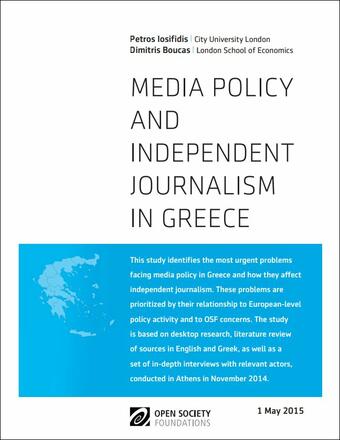
Media policy and independent journalism in Greece
Which are the most urgent problems facing media policy in Greece? How do they affect independent journalism in the country? How do they relate to European-level policy. This OSF report tries to answer these questions based on desktop research, literature review of sources in English and Greek, as well as a set of in-depth interviews with relevant actors, conducted in Athens in November 2014.
Since the 1980s and ’90s, deregulation has increased the viewing choices for audiences in Greece. At the same time, the legal and regulatory framework has helped concentrate ownership of press, television, and radio outlets. Private channels operate with temporary licenses and independent regulatory authorities function superficially and ambivalently.
As a result, the market has been dominated by a handful of powerful newspaper interests, which have expanded into audiovisual and online media. Recent laws have further liberalized media ownership and cross-ownership.
The abrupt closure of the public broadcaster ERT in 2013 further damaged pluralism in Greek journalism, since ERT was the only broadcaster—in a market dominated by unlicensed commercial channels—with a legal obligation to provide objective, unbiased news.
Meanwhile, self-organization in media production and the quest for new sustainable business models have given rise to independent, media.
This OSF report is organized into 6 chapters, devoted respectively to Media Ownership and Regulation in the Greek media landscape; Media Dependencies on State Funding, Advertising, and Economic Interests; The Closure of the Public Broadcaster ERT; Digital Switch-over of Broadcasting; Safeguards for Journalism and the legal environment.
Tags: Media freedom Media ownership GreeceThe content of this article can be used according to the terms of Creative Commons: Attribution-NonCommercial 4.0 International (CC BY-NC 4.0) . To do so use the the wording "this article was originally published on the Resource Centre on Media Freedom in Europe" including a direct active link to the original article page.

